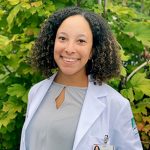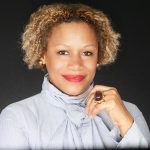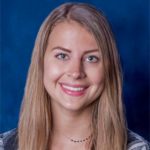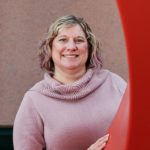 Congratulations to AssociateProfessor Alaina Brenick, whose project, Validating a measure of school-based interpersonal and institutional discrimination experienced by transgender and gender non-binary youth was funded by the UConn Justice, Equity, Diversity, and Inclusion (JEDI) Research Initiative.
Congratulations to AssociateProfessor Alaina Brenick, whose project, Validating a measure of school-based interpersonal and institutional discrimination experienced by transgender and gender non-binary youth was funded by the UConn Justice, Equity, Diversity, and Inclusion (JEDI) Research Initiative.
Author: Janice Berriault
Annelieses Lapides, HDFS Alumni Spotlight, March 2023
 Anneliese graduated from UConn in 2020 with a B.A. in HDFS and a B.S. in Biological Sciences. As a pre-med student who hoped to become a pediatrician, she added an HDFS major in order to foster an understanding of physical, social, and emotional child development. By pursuing HDFS, she was able to emphasize the multidisciplinary human side of medicine. Anneliese is currently in her third year of medical school at the Larner College of Medicine at the University of Vermont (LCOM) and is completing her clinical rotations at the school’s Connecticut Campus in Norwalk and Danbury. She plans to apply for pediatrics residency in September, and will either focus on primary care, developmental/behavioral pediatrics, or pediatric oncology. She also is interested in medical education and mentoring.
Anneliese graduated from UConn in 2020 with a B.A. in HDFS and a B.S. in Biological Sciences. As a pre-med student who hoped to become a pediatrician, she added an HDFS major in order to foster an understanding of physical, social, and emotional child development. By pursuing HDFS, she was able to emphasize the multidisciplinary human side of medicine. Anneliese is currently in her third year of medical school at the Larner College of Medicine at the University of Vermont (LCOM) and is completing her clinical rotations at the school’s Connecticut Campus in Norwalk and Danbury. She plans to apply for pediatrics residency in September, and will either focus on primary care, developmental/behavioral pediatrics, or pediatric oncology. She also is interested in medical education and mentoring.
Anneliese’s other passions include social justice and advocacy for racial equity, including working to dismantle systemic racism that has led to health inequities and understanding the social determinants of health. She developed this passion while taking Research Methods in HDFS. During her time in medical school, she served as her class representative on the Medical Education Antiracism Task Force. In December 2020, she co-founded a local non-profit in her hometown of East Lyme, CT: the Southeastern Connecticut Organization for Racial Equity (SCORE). She currently serves as the group’s Director of Community Engagement. The organization has worked to provide scholarships for graduating high school students of color, presented to the town Board of Selectmen to discuss racism as a public health crisis, and worked with the Board of Education on their diversity, equity, and inclusion efforts. Anneliese is dedicated to using her platform as a future physician to ensure that everyone has equitable access to healthcare, and believes that pediatrics is a great place to enact social change to break harmful systemic cycles.
Suge Zhang, HDFS Graduate Student Spotlight, March 2023
 Suge Zhang is a first-year PhD student working with Dr. Charles Super as an advisor. Her primary interest lies in how race, ethnicity, and culture interact to affect the experiences of Asian and Asian American parents and children. In particular, she is interested in ethnic-racial socialization among Asian immigrant families from an intergenerational perspective. Another line of her research focuses on Asian American fathering and the role of employment in Asian American fathers’ involvement in parenting.
Suge Zhang is a first-year PhD student working with Dr. Charles Super as an advisor. Her primary interest lies in how race, ethnicity, and culture interact to affect the experiences of Asian and Asian American parents and children. In particular, she is interested in ethnic-racial socialization among Asian immigrant families from an intergenerational perspective. Another line of her research focuses on Asian American fathering and the role of employment in Asian American fathers’ involvement in parenting.
Prior to starting her doctoral study at UConn, Suge worked as a Research Associate at the Yale Child Study Center, where she supported the preliminary development and validation of a new, multidimensional measure of Chinese parents’ emotion regulation beliefs and behaviors. She graduated from New York University (NYU) with a bachelors in social work and drama in 2018 and a masters of social work in 2019. During her time at NYU, Suge accumulated a diverse range of work experiences encompassing academic research, clinical practice, and social activism concerning understudied, under-recognized needs and challenges of Asian American families in New York City.
Suge was born and raised in China and moved to the US with her parents when she was 13. She attended New Haven public schools and spent her adolescent years in the East Rock neighborhood. During her free time, Suge enjoys exploring local eateries in New Haven with her friends and family.
Vida Samuel, HDFS Faculty Spotlight, March 2023
 Vida Samuel came to UConn Stamford in 2016 as an adjunct professor while leading a communication consulting business for women new to leadership positions. She has been an Assistant Professor in Residence in HDFS since 2018.
Vida Samuel came to UConn Stamford in 2016 as an adjunct professor while leading a communication consulting business for women new to leadership positions. She has been an Assistant Professor in Residence in HDFS since 2018.
Vida is a scholar in women’s studies and intercultural communication and received her master’s in speech and interpersonal communication from New York University where she was also an administrator and sat on the Dean’s leadership team. Her interests focus on the sexual lives of women at midlife. During her time at NYU, Vida developed recruitment and retention strategies focused on non-traditional graduate and doctoral nursing students and students of color. She also served as the President of the Greater New York Healthcare Recruiters Association and as the scholarship chair, raising funds for undergraduate nursing student scholarships for New York City nursing students. Vida was instrumental in increasing NYU’s undergraduate student membership to paraprofessional nursing associations. She also sat on the Advance Nurses Magazine Editorial Advisory Board.
After living in New York City for 17 years, Vida left to pursue her PhD with a focus in intercultural communication and women’s studies at Howard University. While in Washington DC, she worked as a researcher at FHI 360, a global, human development, non-profit organization that studies and gathers evidence to deliver community based solutions in the United States and around the world.
Vida is active in her community and is often a featured speaker for issues impacting women and girls. In a 2022 Babe with the Power podcast, she examined the consequences of the Supreme Court’s decision to repeal Roe v Wade on young college women. She facilitated a conversation for young women in high school and college on Race in America and was interviewed for the Healin’ Podcast about anti-racist perspectives. Vida served as an education expert panelist responding to the Fairfield County Community Foundation – Fund for Women and Girls 2019, Fairfield County Community Wellbeing Index, was a featured speaker and panelist for the Connecticut Women’s Hall of Fame Your Voice your Vote: Be Remote to Promote the Vote and The “F” Word – Feminism: A Conversation Between Generations. Vida’s interests in the arts provided her with an opportunity to be the copy editor for the Schomburg Center for Research in Black Culture’s exhibit program Unveiling Visions and co-editor of the companion book, Cosmic Underground: A Grimoire of Black Speculative Discontent. She also peer reviews academic journals.
Vida currently serves on the board of LiveGirl, and in 2022, along with UConn students and LiveGirl interns, held a rally in Stamford for HB-5272, a bill to reduce the social stigma and shame attached to menstruation and move toward health equity. She evaluates scholarship applications for the Mandela-Washington Fellows program and volunteers as an academic mentor for the annual Jackie Robinson Foundation Mentoring and Leadership Conference. She is a contributor to the recent released report The Economic Impact of COVID-19 on Connecticut’s Women: A Statewide Data Collection Initiative published by The Permanent Commission on the Status of Women in Connecticut.
Vida was born in St. Lucia, holds a certificate in culinary arts, has a deep love of food, experimenting with unfamiliar food products, and entertaining. She is also a music enthusiast who is fascinated with drums, regularly attends live concerts, and cannot live without David Sedaris’ books. Vida lives in Fairfield County with her husband.
Rebecca Puhl featured in several outlets discussing weight stigma
 Rebecca Puhl was featured in several outlets discussing weight stigma:
Rebecca Puhl was featured in several outlets discussing weight stigma:
-
- NBC News: Interviewed on weight stigma, health, and weight loss
- The Nourished Child Podcast: Weight stigma in youth
- WBUR-FM: Stigma and ‘fat shaming’ can fuel depression and increase obesity
- Bloomberg: Obesity drugs for kids? Why new guidelines make sense
- Business Insider: Weight discrimination may shorten your life – here are 5 ways to confront the stigma and stop the stress from affecting your health
Annamaria Csizmadia featured in Journal Inquirer article
 Associate Professor Annamaria Csizmadia was featured in a Journal Inquirer article about social media and kids.
Associate Professor Annamaria Csizmadia was featured in a Journal Inquirer article about social media and kids.
HDFS faculty and grad students present at SBM Conference
Seven HDFS faculty and six HDFS graduate students will be giving nine presentations at the Society for Behavioral Medicine in Phoenix this April. See a list of all the presentations here!
Cali Salafia awarded Fellowship from MSK Cancer Center
 Graduate student Cali Salafia was awarded a Predoctoral Research Fellowship in Psycho-Oncology from Memorial Sloan Kettering Cancer Center to begin late May 2023. Congratulations Cali!
Graduate student Cali Salafia was awarded a Predoctoral Research Fellowship in Psycho-Oncology from Memorial Sloan Kettering Cancer Center to begin late May 2023. Congratulations Cali!
Lexi Tomkunas receives research funding from Africana Studies
 Congratulations to graduate student Lexi Tomkunas, who received funding from the Collaborative to Advance Equity Through Research on Women and Girls of Color through Africana Studies at UConn, for her project on Black girls and discipline through Florida schooling.
Congratulations to graduate student Lexi Tomkunas, who received funding from the Collaborative to Advance Equity Through Research on Women and Girls of Color through Africana Studies at UConn, for her project on Black girls and discipline through Florida schooling.
Kari Adamsons interviewed on CT Public Radio show “Disrupted”
 Associate Professor Kari Adamsons was interviewed for the Connecticut Public Radio show “Disrupted” about parenting, fathering, and why we need to move beyond the idea of the “traditional family.” Listen to the interview here (her bit is in the second half – the title refers to the person who was in the first half).
Associate Professor Kari Adamsons was interviewed for the Connecticut Public Radio show “Disrupted” about parenting, fathering, and why we need to move beyond the idea of the “traditional family.” Listen to the interview here (her bit is in the second half – the title refers to the person who was in the first half).